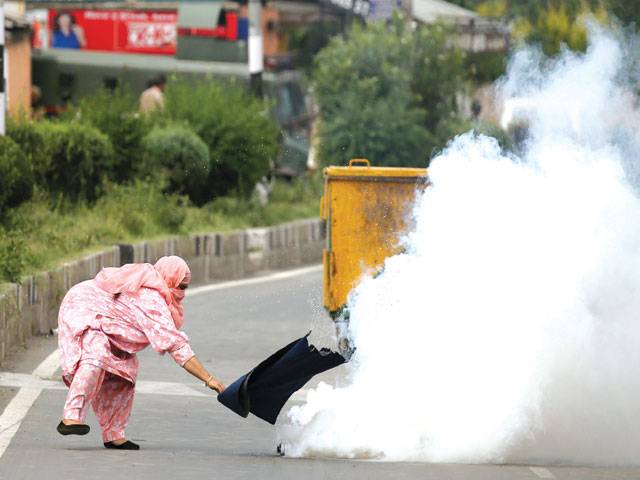India swamps offer for Kashmir talks

Says ready to discuss ‘terrorism’ aspect only
ISLAMABAD - India yesterday rejected Pakistan’s offer for talks over the Kashmir issue yet again seeking to restrict such dialogue to terrorism only, officials said.
The response to Pakistan’s offer for talks was handed over to Pakistan by Indian High Commissioner Gautam Bambawale here, officials at the foreign ministry said.
Even before the latest negative reply, India had been claiming Kashmir as its integral part and had refused a series of offers from Pakistan for the dialogue.
Responding to Pakistan Foreign Secretary Aizaz Ahmad Chaudhry’s invitation for talks over the Kashmir issue, his Indian counterpart S Jaishankar said he was willing to visit Islamabad but only to discuss terrorism and Kashmir was an ‘internal mater’ of India.
“Since aspects related to cross-border terrorism are central to the current situation in J&K (Jammu and Kashmir), we propose that discussions between the foreign secretaries be focused on them,” the reply from India said.
A senior official at the Ministry of Foreign Affairs said Pakistan had conveyed to India that there cannot be talks on terrorism excluding the key Kashmir dispute.
Another official said Pakistan was reviewing India’s response.
This week, Pakistan invited India for talks on Kashmir, saying it was the “international obligation” of both the countries to resolve the issue, notwithstanding India’s insistence that it would talk on “contemporary and relevant” issues in Pak-India relations.
“The letter (sent on Monday to Indian External Affairs secretary through Indian High Commissioner in Islamabad) highlights the international obligation of both the countries, India and Pakistan, to resolve the Jammu and Kashmir dispute, in accordance with the UN Security Council resolutions,” an earlier issued statement said.
The invitation was extended amid tension in bilateral ties due to the war of words between the two nations over ongoing violence in Kashmir.
The olive branch was shown by Pakistan after five weeks of violent protests in Indian-occupied Kashmir that were sparked by the killing by security forces of a young freedom fighter - Hizbul Mujahideen field commander Burhan Wani - who enjoyed wide support among the people.
More than 70 civilians have died and over 7,000 injured in clashes with Indian security forces. Use of pellet guns by the police and soldiers has caused loss of sight to dozens of young protesters. Pakistan has been denouncing use of sheer force against the people who are demanding right to self-determination, as per the UN Security Council resolutions.
The foreign ministry official said Pakistan cannot accept talks with preconditions. “We are ready to discuss terrorism and other issues also but we cannot ignore Kashmir. The whole world knows Kashmir is not India’s internal matter,” he added.
Pakistan’s formal invitation for talks came days after PM’s Adviser on Foreign Affairs Sartaj Aziz told reporters, “As for India, the Envoys Conference noted that India’s policy of not engaging in a comprehensive dialogue with Pakistan was not conducive for peace in South Asia. In this regard, Pakistan should invite India for a dialogue on Jammu and Kashmir. Our foreign secretary would formally be writing to his counterpart in this regard.”
Responding to Aziz’s statement, India on Saturday said it would welcome a dialogue on “contemporary and relevant” issues in India-Pakistan relations.
Talking about Pakistan’s offer for talks on Kashmir, Indian Defence Minister Manohar Parrikar on Tuesday told a rally in IHK that “going to Pakistan is the same as going to hell”. This highly irresponsible statement came on the very day Indian security forces killed five protesters and injured 10 others.
Agencies add: Sources in India’s External Affairs ministry told Reuters that Foreign Secretary Subrahmanyam Jaishankar was willing to attend talks on the invitation of his Pakistani counterpart, stressing that cross-border terrorism was central to the situation in J&K.
They however added that India “rejects in their entirety the self-serving allegations regarding the situation in J&K, which is an integral part of India.”
New Delhi accuses Islamabad of arming and training the militants fighting to end Indian rule in Jammu and Kashmir.
Islamabad says it gives only moral and diplomatic backing to Kashmiris because it’s its moral duty to the people who wanted their state to be part of Pakistan at the time of partition in 1947, and who continue to struggle for their right to self-determination.





